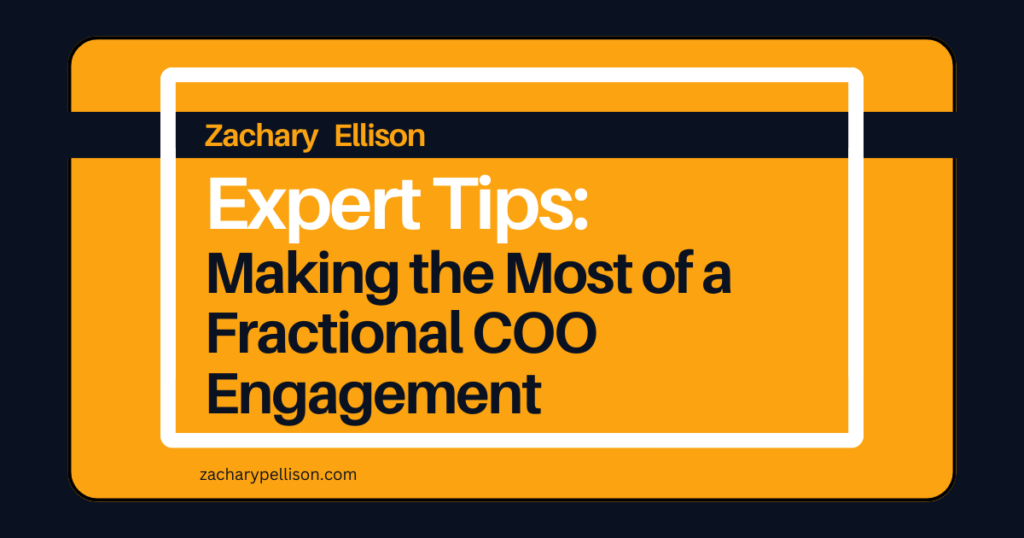Making the Most of a Fractional COO Engagement: Expert Tips
 In today’s rapidly changing business landscape, companies are constantly striving to stay ahead of the competition and achieve sustainable growth.
In today’s rapidly changing business landscape, companies are constantly striving to stay ahead of the competition and achieve sustainable growth.
One strategy that has gained considerable popularity in recent years is the engagement of fractional Chief Operating Officers (COOs).
These experienced executives offer their expertise on a part-time basis, providing strategic guidance, operational leadership, and business management support.
In this blog, we will unravel the concept of a fractional COO, explore the key responsibilities that define their role, discuss the benefits of hiring one for your business, and provide expert tips on making the most of a fractional COO engagement.
Unraveling the Concept of a Fractional COO
Fractional COO is an increasingly popular option for businesses looking to access the expertise and experience of a Chief Operating Officer without the need for a full-time hire.
A fractional COO is a seasoned executive who offers their services to multiple companies simultaneously, typically on a part-time basis.
They bring years of experience in business management, operational efficiency, and strategic planning to support businesses across various industries.
The Evolution of Fractional COOs
Fractional COOs have become a great way for smaller companies to access broad experience and strategic guidance without the cost of hiring a full-time executive.
These fractional executives specialize in specific areas of expertise, supporting the business needs of various industries.
They bring years of experience working with companies of different sizes and stages of growth, offering valuable insights and actionable plans to small business owners.
By engaging a fractional COO, smaller businesses can benefit from the operational leadership and strategic planning that comes with years of experience in the field.
Seasoned fractional executives support small business owners in taking their business operations to the next level. They understand the specific needs of the business and tailor their approach to best serve the unique challenges faced by each business owner.
Whether it’s streamlining operations, optimizing supply chain management, or developing a growth strategy, fractional COOs bring a fresh perspective and experienced guidance to help businesses thrive.
A Deeper Look into the Role of a Fractional COO
The role of a fractional COO encompasses a wide range of responsibilities, all aimed at driving operational efficiency, strategic planning, and overall business success.
Fractional COOs provide operational leadership, overseeing the day-to-day operations of a company, and implementing best practices to improve efficiency and effectiveness.
In addition to operational leadership, fractional COOs play a crucial role in strategic planning.
They work closely with business owners to develop actionable plans and strategies that align with the long-term goals of the company.
By leveraging their experience and expertise, fractional COOs help businesses navigate the complexities of the market, identify growth opportunities, and make strategic decisions that drive sustainable growth.
Furthermore, fractional COOs are well-versed in the intricacies of business operations. They bring years of experience working with various businesses, understanding the challenges and dynamics of different industries.
This knowledge and experience enable fractional COOs to develop tailored solutions to address specific business needs, whether it’s process improvement, supply chain management, or human resources development.
Key Responsibilities that Define a Fractional COO’s Role

As a fractional COO, the key responsibilities of the role revolve around strategic planning, operational efficiency, team building, financial oversight, and risk mitigation. Let’s take a closer look at each of these areas and how they contribute to the success of a business.
Strategic Planning and Implementation
Strategic planning is at the core of a fractional COO’s role. They provide strategic guidance, working closely with business owners to develop and implement business strategies that align with the company’s goals.
Fractional COOs analyze market trends, identify growth opportunities, and develop actionable plans that drive sustainable growth.
By taking a strategic approach, businesses can make informed decisions and stay ahead of the competition.
Making the Most of a Fractional COO Engagement
Operational efficiency is crucial for the success of any business. A fractional COO plays a key role in optimizing business processes, improving operational efficiency, and driving continuous improvement.
Here are some ways fractional COOs boost operational efficiency:
- Implementing process improvement initiatives to streamline operations and eliminate inefficiencies.
- Analyzing and optimizing supply chain management to reduce costs and improve product delivery.
- Developing performance metrics and tracking systems to measure operational efficiency.
- Implementing technology solutions to automate manual processes and improve productivity.
- Providing guidance and support to improve overall business processes and operational effectiveness.
Team Building and Development
Effective team building and development are essential for creating a strong, cohesive workforce.
Fractional COOs play a vital role in fostering team development and ensuring the team members are aligned with the company’s goals and objectives.
Here’s how fractional COOs support team building and development:
- Assessing team dynamics and identifying areas for improvement.
- Implementing team development initiatives, such as training programs and workshops.
- Providing leadership development coaching and mentoring to team members.
- Aligning team members’ skills and talents with strategic business needs.
- Developing a positive and collaborative team culture that promotes growth and innovation.
Financial Oversight
Financial oversight is a critical responsibility of fractional COOs, as businesses need to maintain financial stability and profitability.
Fractional COOs provide guidance and support to business owners in managing their finances effectively.
Here’s how fractional COOs contribute to financial oversight:
- Monitoring cash flow to ensure the business has adequate resources to meet its obligations.
- Analyzing financial data and providing insights to improve the bottom line of the business.
- Developing financial forecasts and budgets to facilitate strategic decision-making.
- Assessing the financial capacity of the business and identifying areas for improvement.
- Collaborating with finance teams to optimize financial processes and efficiency.
Risk Mitigation
Every business faces risks, and fractional COOs play a vital role in identifying and mitigating potential risks. They bring years of experience in risk management, change management, and making strategic decisions to minimize the impact of risks.
Here’s how fractional COOs support risk mitigation:
- Conducting risk assessments to identify potential threats and vulnerabilities.
- Developing risk management strategies and action plans to mitigate risks.
- Implementing change management initiatives to navigate business challenges.
- Making strategic decisions based on a thorough understanding of the business landscape.
- Providing guidance and support to leadership teams in managing and mitigating risks.
Why Hiring a Fractional COO Makes Sense for Your Business

Engaging a fractional COO can bring numerous benefits to your business, regardless of its size or industry. Here are some reasons why hiring a fractional COO makes sense:
Achieving Cost-Effective Leadership
Hiring a full-time executive can be a costly endeavor, especially for smaller businesses. Engaging a fractional COO provides the opportunity to tap into the expertise of experienced senior leaders without the financial burden of a full-time hire.
Fractional COOs offer cost-effective leadership, allowing businesses to access strategic guidance and operational expertise on a part-time basis.
By leveraging the fractional COO’s experience, businesses can make informed decisions, drive growth, and optimize operational efficiency, all without the high costs associated with a full-time executive.
Gaining Expert Insights and Fresh Perspectives
Fractional COOs bring a wealth of experience and expertise from working with various businesses across industries. This breadth of experience provides businesses with valuable insights and fresh perspectives on strategic decisions, operational processes, and growth opportunities.
By engaging a fractional COO, businesses gain access to an experienced executive who can offer new ideas, innovative solutions, and practical guidance.
The fractional COO’s fresh perspective can help businesses see their operations from a different angle, identify areas for improvement, and make data-driven decisions based on best practices and industry trends.
Leveraging the Flexibility of Engagement
One of the significant advantages of engaging a fractional COO is the flexibility of the engagement. Unlike a full-time hire, businesses can tailor the fractional COO’s services to their specific needs, scaling up or down as required.
Fractional COOs can be engaged for specific projects, strategic planning, or ongoing operational support, providing businesses with the ability to access executive-level expertise on-demand.
This flexibility allows businesses to allocate resources efficiently, ensuring that the fractional COO’s services are aligned with the business’s goals and priorities, without the long-term commitment and associated costs of a full-time executive.
How to Determine the Right Time to Engage a Fractional COO?
Determining the right time to engage a fractional COO depends on various factors specific to your business. Here are some key considerations to help you decide when to engage a fractional COO:
Evaluating Your Business Needs
Evaluating your business needs is fundamental in determining when to engage a fractional COO. Consider the specific areas where your business could benefit from the expertise of an experienced executive.
Fractional COOs can support small businesses in various areas, such as operational efficiency, strategic planning, team development, and financial management.
Assessing your business needs and identifying the areas where a fractional COO could make the most significant impact will help you determine the right time to engage their services.
Understanding Your Financial Capacity
Understanding your financial capacity is crucial when considering the engagement of a fractional COO. Evaluate your budget and cash flow to ensure that hiring a fractional COO is financially feasible for your business.
Engaging a fractional COO can bring valuable leadership and strategic guidance, but it’s essential to align the cost of their services with your financial resources.
Conduct a thorough assessment of your financial capacity and weigh the potential return on investment against the cost of hiring a fractional COO to determine the right time to engage their services.
Decoding the Cost of Hiring a Fractional COO

Understanding the cost of hiring a fractional COO is critical in making an informed decision for your business.
While the cost of engaging a fractional COO varies depending on factors such as experience, scope of services, and the specific needs of the business, there are common factors that influence the cost.
Factors Influencing the Cost
The average salary of a fractional COO is one of the primary factors influencing the cost of hiring their services. Fractional COOs bring years of experience, expertise, and a track record of success, which translates into their compensation.
Additionally, the scope of services and the duration of the engagement also impact the overall cost. Some fractional COOs may offer stock options or performance-based incentives, which can further influence the cost of hiring their services.
It’s essential to evaluate the cost of hiring a fractional COO against the potential benefits and the specific needs of your business to make an informed decision.
Cost-Benefit Analysis
When considering the cost of hiring a fractional COO, it’s important to conduct a cost-benefit analysis. Evaluate the potential benefits of engaging a fractional COO, such as improved operational efficiency, strategic guidance, and sustainable growth, against the associated costs.
While the cost of hiring a fractional COO may seem significant, it’s crucial to consider the long-term impact on your business’s bottom line.
A fractional COO can provide the expertise and leadership needed to drive growth and optimize operations, resulting in sustainable business growth and improved financial performance in the long run.
Maximizing Benefits from a Fractional COO Engagement
Engaging a fractional COO can yield significant benefits for your business if approached strategically. To make the most of the engagement, consider the following tips:
Tips for a Successful Fractional COO Engagement
- Clearly define expectations and goals for the engagement, ensuring that both parties are aligned.
- Foster open and transparent communication, providing regular updates and feedback.
- Provide the necessary resources and support to enable the fractional COO to perform their role effectively.
- Develop a strong working relationship, fostering trust, and collaboration.
- Continuously evaluate and adjust the engagement, ensuring that it remains aligned with the evolving needs of the business.
Common Pitfalls to Avoid
While engaging a fractional COO can bring immense value to your business, it’s important to be aware of potential pitfalls and take steps to avoid them.
Here are some common pitfalls to avoid when working with a fractional COO:
- Lack of clarity: Ensure there is clear communication and understanding between the COO and the rest of the team. Miscommunication can lead to misunderstandings and hinder progress.
- Overdependence: While fractional COOs provide valuable expertise, it’s important to involve other team members in decision-making processes. Relying too heavily on the fractional COO can stifle creativity and growth within the team.
- Short-term focus: Avoid prioritizing immediate gains over long-term goals and sustainability. Work with the fractional COO to develop strategies that drive sustainable growth and align with the long-term vision of the business.
- Resistance to change: Embrace new ideas and strategies suggested by the COO, even if it means changing current practices. Fractional COOs bring fresh perspectives and valuable insights that can help drive innovation and improvement.
- Poor integration: Integrate the fractional COO into the existing team structure and culture to ensure a smooth transition and effective collaboration. Foster a sense of belonging and support the fractional COO’s efforts to drive positive change within the organization.
Is Your Business Ready to Benefit from a Fractional COO?

If your business is experiencing growth or going through a significant change, engaging a fractional COO can be a valuable asset.
Fractional COOs bring years of experience and expertise that can help navigate the complexities of business operations, drive growth, and optimize efficiency.
Here are some considerations to determine if your business is ready to benefit from a fractional COO:
- Assess the current state of your business: Evaluate the areas of your business that require improvement, whether it’s operational processes, team management, strategic planning, or financial management. If your business has specific needs that could benefit from the expertise of an experienced executive, engaging a fractional COO may be the right move.
- Evaluate your team’s capabilities: Consider the skill sets and expertise of your existing team members. If your team lacks specific skills or experience, a fractional COO can fill the gaps and provide the guidance needed to drive growth and optimize operations.
- Determine the readiness for change: Engaging a fractional COO often involves implementing new strategies, processes, and initiatives. Assess the willingness of your team and organization to embrace change and adapt to new ways of doing things. If your business is ready for change and improvement, a fractional COO can help drive the necessary transformation.
Frequently Asked Questions
What is a fractional COO and what do they do?
A fractional COO is a part-time executive who oversees daily operations and drives growth for multiple companies concurrently.
They offer strategic guidance, enhance operational efficiency, and aid in leadership development. Hiring a fractional COO can be a cost-effective alternative to a full-time executive role.
How can a business benefit from a fractional COO engagement?
A fractional COO engagement offers businesses multiple benefits. It provides access to expertise and experience without the cost of a full-time executive.
A fractional COO can offer strategic guidance and help implement operational improvements.
Moreover, it allows businesses to scale up or down as needed without worrying about hiring or firing costs. Additionally, fractional COOs can help businesses navigate challenges, drive growth, and keep costs under control.
What are some best practices for working with a fractional COO?
To make the most of a fractional COO engagement, it’s essential to establish clear responsibilities and objectives.
Regular communication ensures alignment and progress towards goals, while providing necessary resources supports their work.
Emphasize a collaborative relationship with shared accountability for optimal results.
Are there any potential challenges or downsides to using a fractional COO?
Potential challenges may arise when using a fractional COO, such as effective communication and coordination, managing expectations, and dealing with the learning curve.
It’s crucial to carefully vet potential fractional COOs for experience and expertise.
Conclusion
In conclusion, a fractional COO engagement can be a game-changer for your business. By leveraging the expertise of seasoned professionals, you can achieve cost-effective leadership, gain fresh perspectives, and benefit from the flexibility of engagement.
To make the most of this arrangement, ensure clear communication, establish goals and expectations, and provide necessary resources. Avoid common pitfalls such as lack of alignment or insufficient involvement.
Determine the right time to engage a fractional COO by evaluating your business needs and understanding your financial capacity.
While the cost of hiring a fractional COO may vary based on factors like industry and company size, a cost-benefit analysis will help determine its value.
If you’re ready to take your business to new heights, consider a fractional COO engagement and get in touch with us for a quote.





